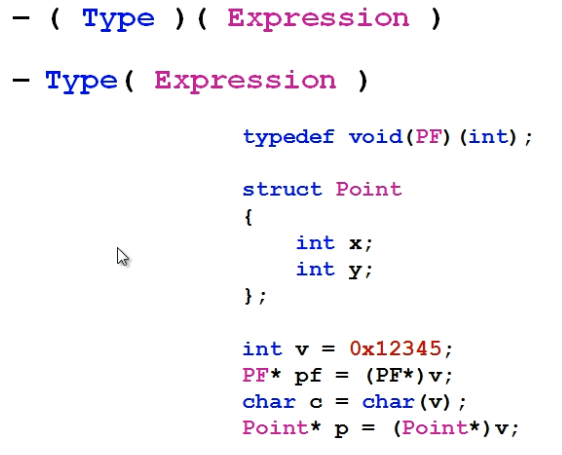C语言方式的强制类型转换:

粗暴的类型转换示例:
1 #include <stdio.h> 2 3 typedef void(PF)(int); 4 5 struct Point 6 { 7 int x; 8 int y; 9 }; 10 11 int main() 12 { 13 int v = 0x12345; 14 PF* pf = (PF*)v; 15 char c = char(v); 16 Point* p = (Point*)v; 17 18 pf(5); 19 20 printf("p->x = %d ", p->x); 21 printf("p->y = %d ", p->y); 22 23 return 0; 24 }
编译运行结果如下:

C方式的强制类型转换存在的问题:
过于粗暴:
任意类型之间都可以进行转换,编译器很难判断其正确性
难于定位:
在源码中无法快速定位所有使用强制类型转换的语句
强制类型转换在工程中是很难完全避免的。
C++将强制类型转换分为四种类型:

static_cast强制类型转换:

const_cast强制类型转换:

reinterpret_cast强制类型转换:

dynamic_cast:

强制类型转换示例:
1 #include <stdio.h> 2 3 void static_cast_demo() 4 { 5 int i = 0x12345; 6 char c = 'c'; 7 int* pi = &i; 8 char* pc = &c; 9 10 c = static_cast<char>(i); 11 pc = static_cast<char*>(pi); 12 } 13 14 void const_cast_demo() 15 { 16 const int& j = 1; 17 int& k = const_cast<int&>(j); 18 19 const int x = 2; 20 int& y = const_cast<int&>(x); 21 22 int z = const_cast<int>(x); 23 24 k = 5; 25 26 printf("k = %d ", k); 27 printf("j = %d ", j); 28 29 y = 8; 30 31 printf("x = %d ", x); 32 printf("y = %d ", y); 33 printf("&x = %p ", &x); 34 printf("&y = %p ", &y); 35 } 36 37 void reinterpret_cast_demo() 38 { 39 int i = 0; 40 char c = 'c'; 41 int* pi = &i; 42 char* pc = &c; 43 44 pc = reinterpret_cast<char*>(pi); 45 pi = reinterpret_cast<int*>(pc); 46 pi = reinterpret_cast<int*>(i); 47 c = reinterpret_cast<char>(i); 48 } 49 50 void dynamic_cast_demo() 51 { 52 int i = 0; 53 int* pi = &i; 54 char* pc = dynamic_cast<char*>(pi); 55 } 56 57 int main() 58 { 59 static_cast_demo(); 60 const_cast_demo(); 61 reinterpret_cast_demo(); 62 dynamic_cast_demo(); 63 64 return 0; 65 }
根据我们上面的分析,第11行是错误的,22行是错误的,47行是错误的,54行是错误的。
小结:
C方式的强制类型转换:
过于粗暴
潜在的问题不易被发现
不易在代码中定位
新式类型转换以C++关键字方式出现
编译器能够帮助检查潜在的问题
非常方便的在代码中定位
支持动态类型识别(dynamic_cast)